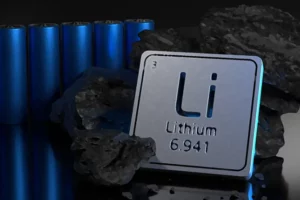Lithium has become an increasingly vital element that is transforming various industries and driving innovation across the globe. Its unique properties and versatile applications make it indispensable for powering the technologies of today and tomorrow. In this article, we will explore the growing importance of lithium and its impact on key industries.
- Electric Vehicles (EVs) and Transportation:
Lithium-ion batteries have revolutionized the automotive industry by enabling the widespread adoption of electric vehicles. With governments and consumers increasingly focused on reducing carbon emissions, EVs have emerged as a sustainable transportation solution. Lithium-ion batteries provide the energy storage required for longer driving ranges, faster charging times, and improved overall performance. The growing demand for electric vehicles is driving the need for large-scale lithium production and creating new opportunities for companies in the lithium sector. - Renewable Energy Storage:
The integration of renewable energy sources, such as solar and wind, into the power grid requires efficient energy storage solutions. Lithium-ion batteries play a crucial role in storing excess renewable energy generated during periods of high production and releasing it when demand is high or renewable sources are not actively generating electricity. This capability helps balance supply and demand, improve grid stability, and maximize the utilization of renewable energy resources. Lithium’s lightweight and high-energy density properties make it ideal for such energy storage applications. - Portable Electronics and Consumer Goods:
Lithium-ion batteries have transformed the consumer electronics industry, powering devices such as smartphones, laptops, tablets, and wearable technology. The demand for compact, long-lasting, and lightweight power solutions has fueled the growth of lithium-ion batteries in these applications. The increasing reliance on portable electronics and the continuous development of new devices drive the demand for lithium, supporting the growth of the lithium industry. - Energy Grid Stability and Resiliency:
As the world transitions to a decentralized energy system with a greater reliance on renewable sources, lithium plays a crucial role in ensuring grid stability and resiliency. Energy storage systems based on lithium-ion batteries provide rapid response capabilities, helping to manage fluctuations in energy supply and demand. By storing excess energy during times of low demand and releasing it during peak demand, lithium-based energy storage systems contribute to a more reliable and resilient energy grid. - Medical and Healthcare Applications:
Lithium has long been used in the treatment of mental health disorders, particularly bipolar disorder. Lithium carbonate is prescribed as a mood stabilizer, helping to manage manic and depressive episodes. Its precise mechanisms of action are still being studied, but lithium’s efficacy in treating mood disorders has made it an essential element in psychiatric medicine. - Industrial Applications:
Lithium compounds find applications in various industrial sectors. Lithium grease is widely used as a lubricant in automotive, aerospace, and industrial machinery applications, thanks to its excellent lubricating properties and high thermal stability. Additionally, lithium-based alloys and compounds are used in ceramics, glass manufacturing, and metallurgy. - Job Creation and Economic Growth:
The growing demand for lithium has significant economic implications, including job creation and economic growth. Lithium mining operations, processing facilities, and battery manufacturing plants provide employment opportunities and stimulate local and national economies. Furthermore, investments in lithium exploration and production contribute to technological advancements and innovation, leading to the growth of related industries and fostering economic development.
In conclusion, the rising importance of lithium is evident across a wide range of industries. From driving the adoption of electric vehicles and supporting renewable energy integration to powering portable electronics and enabling grid stability, lithium has become an indispensable resource. The continued development of lithium technologies and the expansion of its applications will further enhance its significance in shaping the future of energy, transportation, and various sectors worldwide.

